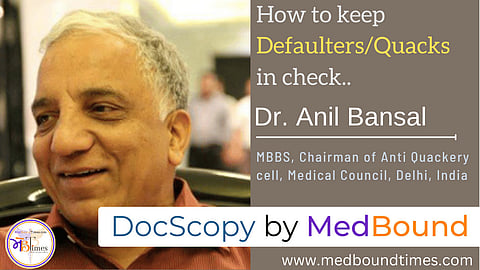Let's read further what Dr. Bansal has to say about his 33 years long career and his battle against the quacks.
Parul: Please tell us about your professional journey and experiences.
Dr. Bansal: After finishing my MBBS (1974-1981) from the University College of Medical Sciences (UCMS), I started my job as a medical officer in 1981 at Delhi Medical Council (DMC). After 33 years of service, I retired from the DMC in March 2015. At present I'm MO at NDMC (New Delhi Municipal Council).
I have been always active in the medical community, and I was elected as president of the Delhi Medical Association in 2003-04.
In the last two Delhi Medical Council elections, in the year 2004 and 2009, I was elected as the chairman of Anti-Quackery cell.
Parul: We are most inquisitive to know about Anti quackery cell! Please explain what do these Quacks do. What is the role of Anti-quackery cell?
Dr. Bansal: Due to high population in India, the Doctor-patient ratio is low. No rules and regulations were implemented initially. Before independence, there were many fake doctors like compounders, etc. In 1956, the government came out with a rule that only qualified MBBS who are registered with the Medical Council of India would be allowed to practice ethically to provide quality healthcare. Legal action will be taken against those who are not registered but still practicing.
However, the practice was going on unethically, when the rule was passed by the parliament. But the awareness was not there, common people could not make out who were the real doctors. The thing was that the MBBS doctors were the real RMP (Registered Medical Practitioners). But some bureaucrats were supporting these quacks, nobody wanted to take legal action against these quacks irrespective of the complaints against them. This issue was raised repeatedly, fight against quacks kept going on.
In 1973, the government of India's Central council of Indian medicine passed a rule that Ayurvedic and Homeopathic doctors will also get registered and do their respective practices. It was never mentioned anywhere that they can practice allopathic medicine.


